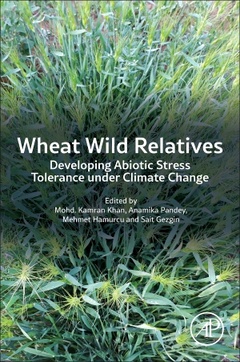Wheat Wild Relatives Developing Abiotic Stress Tolerance under Climate Change
Coordonnateurs : Khan Mohd. Kamran, Pandey Anamika, Hamurcu Mehmet, Gezgin Sait

Wheat Wild Relatives: Developing Abiotic Stress Tolerance under Climate Change presents a state-of-the-art outline of the problem, including issues, opportunities, and modern developments in the utilization of Wild Wheat Relatives (WWR) and related neglected species for wheat crop improvement, specifically focusing on environmental constraints. The book comprehensively discusses different wheat wild relatives, including major genus Triticum and Aegilops and their utilization in mitigating different environmental constraints using agronomic, physiological, and molecular approaches. Chapters provide insights into the advancement in the deployment of wheat genetic resources, including wild relatives and neglected species for crop improvement towards environmental issues. Wheat is a major staple food crop that has largely been focused for fulfilling the food requirements of world population during the Green revolution. Since then, it has come to cover more agricultural land than any other commercial crop. Continuously changing climatic conditions have drastically affected wheat production, with yields largely limited by environmental constraints. Theses production losses caused by crop vulnerability to climate change may be resolved by using wheat wild relatives that are closely related to cultivated genotypes and known for their beneficial traits.
2. Use of Wild Relatives in Breeding Programs to develop Climate Resilient Wheat
3. Advancement in Genome Sequencing of Wheat Wild Relatives
4. Utilization of Wheat Wild Relatives for improving Drought Tolerance
5. Utilization of Wheat Wild Relatives for improving Cold Tolerance
6. Utilization of Wheat Wild Relatives for improving Heat Tolerance
7. Utilization of Wheat Wild Relatives for improving Salinity Tolerance
8. Utilization of Wheat Wild Relatives for improving Boron Stress Tolerance
9. Utilization of Wheat Wild Relatives for improving Low Nitrogen Stress Tolerance
10. Utilization of Wheat Wild Relatives for improving Fe-Zn deficiency Tolerance
11. Utilization of Wheat Wild Relatives for improving Ozone stress tolerance
12. Utilization of Wheat Wild Relatives for improving heavy metals stress tolerance
13. Exploring Genetic Variation for Environmental Stress Tolerance in Wheat Wild Relatives using Molecular Markers
14. Different Approaches used for Successful Utilization of Wheat Wild Relatives for Crop Improvement - Agronomic, Physiological, Biochemical and Molecular Strategies
15. Use of Wheat Wild Relatives to improve End-use Quality in a Continuously Changing Climate Scenario
16. Microbiome Manipulation and Exploitation of Wild Relatives’ Microbiome into Wheat breeding strategies and adaptation programmes
17. Utilization of Perennial Wheat Wild Relatives for the development of Abiotic Stress Tolerant Wheat Lines
Dr. Anamika Pandey is currently working in the capacity of Assistant Professor at Department of Soil Science and Plant Nutrition, Faculty of Agriculture, Selcuk University, Turkey. She has handled a 1001 national project funded by The Scientific and Technological Research Council of Turkey (TUBITAK) related to the determination of novel genes regulating boron toxicity tolerance in some of the Poaceae family species including wild wheat. She earned her PhD degree in biotechn
- Covers a variety of wheat genetic resources, including wheat wild relatives (WWR) and neglected wheat species
- Describes advances in agronomic, biochemical, physiological, and molecular approaches to counter the effect of individual environmental issues of drought, heat, salt, cold, nutrients, and heavy metals constraints
- Explores the benefits of contemporary biotechnological tools, including whole genome sequencing and genome editing
Date de parution : 09-2024
Ouvrage de 475 p.
15x22.8 cm



